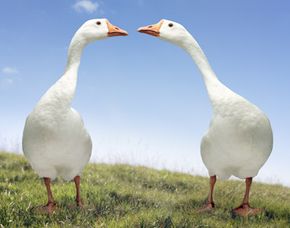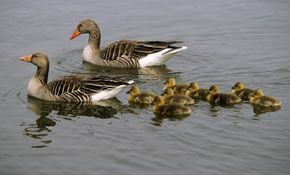Quck answer
Geese mate for life because it helps them ensure the survival of their offspring. By staying together, they can protect their young from predators and share parenting duties. Additionally, geese are social creatures and often form strong bonds with their partners. These lifelong relationships also provide emotional support and companionship. When a goose loses its mate, it may grieve for a period of time and struggle to find a new partner. Overall, monogamy is a successful mating strategy for geese and helps them thrive in their natural habitat.
Wild Animals

Love at first sight. See more pictures of birds.
Digital Zoo/Digital Vision/Getty Images
The divorce rate is high among humans, but over 90% of all birds are monogamous. Geese are known for forming long-term pair bonds. These water birds are successful in their relationships because they maintain an essentially exclusive relationship, or pair bond, with just one member of the opposite sex.
The reason for geese mating for life is straightforward — mating systems are generally determined by whichever arrangement maximizes the participants’ breeding opportunities. In the case of monogamy, a relatively exclusive relationship appears to be the optimal arrangement for both sexes.
Although geese are loyal, they are not as virtuous as they seem. DNA testing has shown that a large percentage of “monogamous” birds occasionally engage in extra-pair copulations. Essentially, socially monogamous animals create strong domestic partnerships with one mate but aren’t always faithful.
Social Monogamy in Geese

One big happy family
Duncan Usher/Foto Natura/Minden Pictures/Getty Images
Social monogamy — when two animals form a lifelong pair and rear offspring together but might not be sexually exclusive — seems to offer geese the best of both worlds. Males spread their sperm by engaging in extra-pair copulations with the occasional female; females enhance the fitness and health of their brood by getting a sampling of sperm from a collection of males; and both sexes benefit from an indispensable partner that will help raise their young.
Geese practice monogamy to increase the chances of their offspring surviving to adulthood. Baby geese are vulnerable to harm and require months of adult care to survive. Female geese need the help of their mates to replenish nutrient reserves to sustain their new brood. Splitting domestic duties between both parents reduces the strain of protecting eggs and caring for hatchlings. Paired geese have higher social rankings, gain access to better foraging opportunities, and are more successful than unmated geese. Geese with strong familial bonds produce more offspring and have increased reproductive success. Most geese have established pair bonds, which allows them to begin nesting without delay. Monogamy ensures their DNA continues into the next generation.
The following is a list of sources related to the topic of monogamy in animals and humans. The sources include scientific studies and articles discussing behaviors associated with seasonal reproduction, long-term monogamy, and fitness consequences in various bird species, as well as opinions and debates on the topic of human monogamy. The sources are listed with their titles, authors, publication dates, and links to their online sources. The list includes HTML tags for headers, paragraphs, and images and should be preserved as is.
FAQ
1. What is the reason behind geese mating for life?
Geese are known for being monogamous, which means they mate for life. The reason behind this is believed to be due to the fact that they are social animals that form strong bonds with their partners. These bonds are formed through a variety of behaviors, including preening, honking, and grooming. Once a pair of geese has formed a bond, they will stay together for life, raising their young and migrating together each year.
2. Do all geese mate for life?
Not all geese mate for life, but many species do. Some species, such as the Canada Goose, are known for being monogamous, while others may mate with multiple partners throughout their lives. However, even among species that are known for being monogamous, not all individuals will necessarily mate for life. Some may form new bonds if their partner dies or if they are separated for a long period of time.
3. How do geese choose their mates?
Geese typically choose their mates through courtship behaviors, such as preening, honking, and dancing. During courtship, male geese will often perform elaborate displays to attract the attention of females. Once a pair has formed a bond, they will continue to strengthen their relationship through other behaviors, such as grooming and sharing food.
4. Do geese ever cheat on their partners?
While geese are known for being monogamous, there are some cases where individuals may cheat on their partners. This is most likely to occur when one partner is unable to mate or when a new individual enters the group and forms a strong bond with one of the existing mates. In some cases, individuals may also form temporary bonds with other geese during migration or other activities.
5. Do geese mourn the loss of their partners?
Geese are known for forming strong bonds with their partners, and when one partner dies, the other may experience grief. In some cases, geese may remain near the body of their deceased partner for several hours or even days, calling out and refusing to leave. However, it is unclear whether geese experience emotions in the same way that humans do, and more research is needed to understand the extent of their grief.
6. What can we learn from geese about relationships?
Geese are a great example of how strong bonds can be formed through social behavior and communication. By observing the way geese interact with their partners, we can learn valuable lessons about building and maintaining strong relationships. Some of these lessons include the importance of communication, trust, and mutual support, as well as the value of shared experiences and activities. Additionally, geese demonstrate the importance of loyalty and commitment in relationships, which are key factors in building lasting connections with others.





Leave a Reply